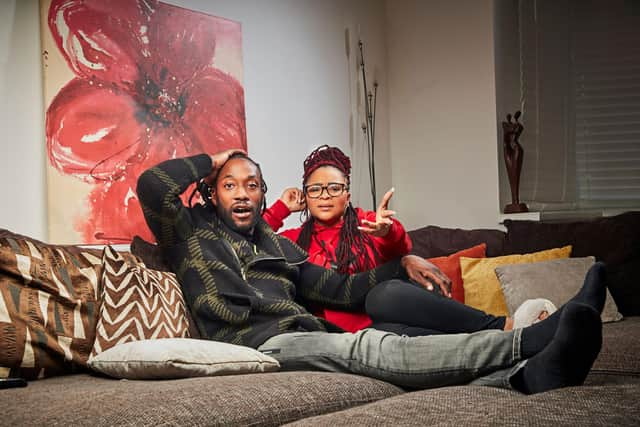Political heat around Channel 4 deflects from crunch issues for British media - John McLellan
Gogglebox is a great entertainment and as a weekly snapshot of social and cultural attitudes actually provides a valuable service, but the ownership of Channel 4 is not something which keeps me awake at night. Channel 4 News comes in for heavy criticism from right-wingers about its perceived left-wing bias, and given Ofcom’s 2021 news consumption report showed the flagship show only reaches three per cent of the population, it’s hardly something to get hot under the collar about.
But after UK Culture Secretary Nadine Dorries this week confirmed plans for a sell-off, it quickly became a lightning rod for Boris Johnson’s many critics, some of them from other parties. For all the heartfelt plaudits from Eastern Europe for the Prime Minister’s response to the Russian invasion, the knives which have been temporarily set to one side remain sharp. Was it revenge for anti-Brexit coverage, asked Culture Committee chair Julian Knight? It was “very unconservative,” said Damian Green and, according to former Scottish Conservative leader Ruth Davidson, “the opposite of levelling up.”
Advertisement
Hide AdAdvertisement
Hide AdWhy a broadcaster responsible for Naked Attraction and Hollyoaks must remain a state property at all costs is not entirely clear, but as it’s entirely commercially funded, Channel 4 doesn’t cost the tax-payer a penny so the proposed sell-off does look like a solution in search of a problem. Ms Dorries has not explained how state ownership is, as she put it, “holding Channel 4 back from competing against streaming giants like Netflix and Amazon”, or how such a global media would emerge if the new owners of an old-fashioned linear channel must still meet public service obligations, as she has made clear they would.


It’s optimistic to expect a buyer to pay the £1bn the Government reckons it’s worth if those responsibilities are to be met, while muscling in on what is already a ferociously competitive market. Netflix spent $17bn on content last year and the reward was a 25 per cent fall in its share price when its Quarter 4 results, published in January this year, revealed it “only” added 8.28m subscribers against a forecast 8.5m.
More parochially, as part of its move out of London in 2019, the station opened a production hub in the Garment Factory in Glasgow’s Merchant City, and with television production and creative industry a rare business success story in Glasgow, anything which threatens to damage the sector should be a cause for concern. But again, the absence of any details of the sale conditions, the likely effects of a disposal are only guesswork, and while veteran producer Alan Clements told The Herald newspaper “it's not good news whatever's coming,” he admitted it was “a wee bit early to say definitively”. If a streaming giant did indeed emerge on the banks of the Clyde, then that would obviously be a good thing.
Amidst the political pile-on, perhaps the most risible was that of Glasgow Council’s SNP leader Susan Aitken, who scoffed "Why put Nadine Dories, a minister who didn’t even have a clue how Channel 4 operates, in charge of the matter?” as if Ms Aitken’s is an expert in street cleaning and waste disposal and the host of other services for which she is responsible and demonstrably failing to deliver. Scottish Culture Secretary Angus Robertson suggested that “privatisation will dilute Channel 4’s focus on creativity and public benefit, substituting this for a focus on commercial shareholders”.
Take your pick. If you don’t like Boris and Nadine it’s a bad idea but the vast majority don’t care. From that point of view, it’s a curious political decision to include something in the Queen’s Speech for which there is zero demand and only a limited immediate benefit. This won’t be a “Tell Sid” British Gas bonanza.
What is troubling is there is plenty Ms Dorries could include in the legislative programme for which there is both demand and pressing need, without which a department established by her predecessor Oliver Dowden will be an expensive white elephant.
The Digital Markets Unit was set up last year as part of the Competitions and Markets Authority specifically to ensure that tech giants Facebook and Google, but also including the likes of Amazon and Netflix, were not using their vast scale to crush competition and destroy independent producers. The legislation to give it the statutory basis on which to act was all set to be included in the Queen’s Speech, but now there have been reports of a delay which has both confused and dismayed the whole of the UK media sector, from broadcasters (including Channel 4), radio producers, news publishers and magazines. “We welcome the efforts of government to date on this vital issue, but our sectors cannot afford any further delay to this critical legislation,” they said in a letter to Mr Johnson last week.
As these are reserved to Westminster, it’s easy for the SNP to have a pop, but the Scottish Government’s recent record on media matters for which it is responsible is nothing to crow about. A report into the sustainability of Scottish public interest journalism was commissioned at the end of 2020 under then culture secretary Fiona Hyslop, and submitted to her successor Mr Robertson five months ago. Since then, nothing has been heard apart from a promise to consider the recommendations carefully.
Advertisement
Hide AdAdvertisement
Hide AdBoth the UK and Scottish Governments say they are committed to a healthy, diverse and independent media sector so it’s about time for both to show that the really mean it. Tell Nadine and Angus, the great Channel 4 sell-off can wait, but the rest of British media can’t.
John McLellan is a Conservative councillor in Edinburgh and director of the Scottish Newspaper Society
